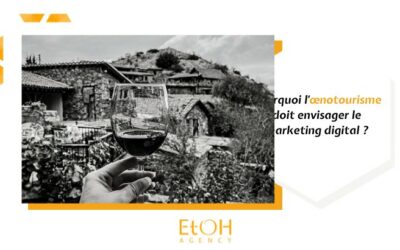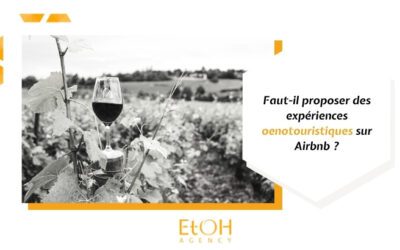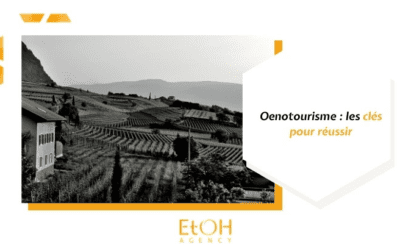Define your wine tourism strategy

Professionalization and networking efforts players in the sector in certain destinations are now demonstrating that wine tourism is an activity that is fully part of the reputation development strategy and the commercial strategy of châteaux, vineyards, producer unions, and even trading houses.
Motivating factors for developing wine tourism
The desire to develop sales
- Owners and managers of estates and châteaux who have this will to put in place wine tourism are motivated by the need to develop sales, especially direct, often to regain a significant share of their margins, but also to address their consumer customers directly.
- trading houses, cooperative structures also have this aspiration by developing wine tourism to meet their needs for customer renewal, direct customer development (in the cellar, then via the web).
Increase its notoriety, improve its image
- The development of notoriety is intended to increase the value of the "brand" or maintain it at a high level. In parallel with the work on the quality of the wines, the work on the brand makes it possible to support the volumes and the intensity of demand which will have a weight in future growth, in particular through the sale price of future vintages.
- Other domain owners and managers aim to use their vineyard as " showroom of prestige. In this case, the development of notoriety is intended to support and consolidate a move upmarket of the group's brand, by increasing its visibility, its power of attraction, of seduction which accompanies the status of owner of a prestigious vineyard.
The development of wine tourism always responds to a motivation of the business manager to give his teams the means to develop the untapped potential of his domain, his castle and therefore exploit new levers of growth. The main objective is still the development of a growth lever direct ou indirect.
What strategies should be adopted to set up wine tourism?
According to a 2017 study of 100 winegrowers open to wine tourism: 99% of them had not defined a strategy
- Unmanaged student internship
- Employee without sales or partnership objectives
- Employee with other constrained functions and therefore not motivated
How to define a wine tourism strategy?
How to set a wine tourism strategy ?
- With outside advice
- Through specialized reading
- By analyzing what you have implemented
- Through competition analysis
- Ask yourself why you want to set up wine tourism?
- What are the objectives ?
- What are my strengths?
- How ? What can or should I put in place?
- What deadline? Depending on availability and material and financial resources?
La success of an activity wine tourism, like any other key business activity, requires defining:
- The customer segments you choose and target,
- The unique and adapted value propositions that you offer to your visitors,
- The communication and distribution channels that allow you to distribute your offers,
- The modes of customer relations that you use to retain your customers.
As a training organization and service agency, our role therefore consists in placing ourselves as guides to help you define the best wine tourism strategy.
What are the visitor flows
- Between 8 et 20% are provided by business contributors: tourist offices, agencies, packaged offers
- Between 80 et 90% come directly: guides, unpaid tourist offices, other areas. They come by appointment (paid visits, organized tastings, etc.) or without an appointment (free cellar visits)
Offer tours for individuals
Example:
- For a one-hour visit to 10€
- On average 3 people for 30€
- Labor time: 20 €
- Margin : 10 €
- Gain of 5€ per visit with consumption of three glasses of wine, i.e. ¼ bottles
- With additional purchase by the customer: approx. 120€
- Or with purchase from them: wine shop, mass distribution, internet
- Gain of a consumer database
Offer tours for groups
Example:
- For a one-hour visit to 10€
- On average 30 people for 300€
- Labor time: 20 €
- Margin : 180 €
- Gain of 140€ per visit with consumption of thirty glasses of wine (4 bottles)
What are the fragility factors?
- The development of the premises requires an investment : Our experiences have shown us that developing an oenotourism activity is not necessarily synonymous with investment in construction, in costly specific arrangements, in pharaonic communication budgets.
- Activity takes time because it dilutes every action
- The profitability of an activity is established in the medium term, in general 10 years ago, : It is not mandatory to have everything to start exploiting wine tourism.
- Tourism stakeholders advocate collective while wine lovers want calm and privacy when meeting the winegrowers
- The multiplicity of actors (agencies, tourist offices, unions) do not bring a simple vision wine tourism, but it is in your interest to have as many partners as possible possible, unless you have a very powerful brand, it is in your best interest to have several partners: Hotels, restaurants, wen provider, wine tour booking, wine guide, etc.
- Lack of knowledge of B2C : Contrary to all cultural and winemaking practices, feedback on wine tourism is not yet widely shared among professionals. Alone, it is therefore difficult to take advantage of each other's past experiences to improve efficiency, avoid pitfalls, find the right answers and use resources wisely.
You must have a pleasant website, which reflects the quality of your wines
Whether you need a simple “showcase” type website or an “e-commerce” type online sale, our experts support you in all of these projects.
Wine tourism needs to have a real strategy, a real logic of development
For allow your teams to reach, see exceed your goals, the most important thing is to be clear about the means you give yourself:
- Have you chosen your priority clienteles and do you know how to reach them?
- Have you adapted your offers for your chosen customers?
- Do you manage to be visible to boost your visits?
4 good reasons to integrate online booking into your site
- Your customers want instantaneous: In 1 click, they know your availability and can book their next activity
- Your website is available 7/7: Did you know? 35% reservations are made outside opening hours.
- More time to spend on important things: How much time do you spend managing reservations via email or phone? Automate these tasks for win time.
- Modernize your business and its day-to-day management: Modernize your business and reach a younger, dynamic and connected clientele. By 2040, 95% purchases worldwide will be made online.
You know your challenges and your objectives.
We know the way and the methods to achieve it!
For further…
Why should wine tourism consider digital marketing?
Wine tourism can be defined as a type of niche tourism centered on the art of wine and all its products, including vineyards, cellars, cellars, etc. But if you're considering building your own wine tourism business, there's...
Should wine tourism experiences be offered on Airbnb?
Would you like to expand your wine tourism activity? Cast your net wide by targeting more visitors. Why not opt for Airbnb? This host brings together thousands of national and international travelers who are currently...
Wine tourism: the keys to success
Wine tourism is an important branch of tourism in France and brings in several million euros per year. So, we can ask ourselves what are the keys to success in this area? Be in good standing with the legislationBefore creating a...



